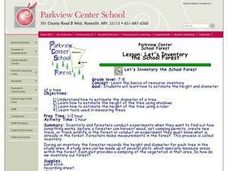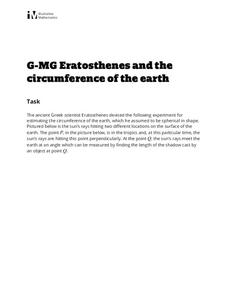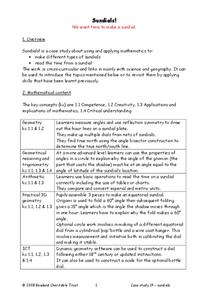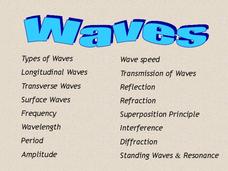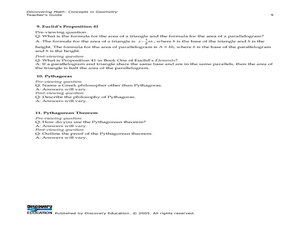Illustrative Mathematics
Tilt of Earth's Axis and the Four Seasons
Geometry meets earth science as high schoolers investigate the cause and features of the four seasons. The effects of Earth's axis tilt features prominently, along with both the rotation of the earth about the axis and its orbit about...
Curated OER
Tennis Triangle
High schoolers calculate the height of a tree or flagpole. They measure the shadow of the tree or flagpole and the length of a shadow of a meterstick. Using similar triangles, calculate the heigh. Devise two additional ways in which to...
Curated OER
Astronomy With a Stick
Students find the altitude of the Sun at 10 A.M., at solar noon, and at 2 P.M. by measuring the height of the gnomon and the length of the shadow at each time. They record the measurements in their notebooks for later conversion.
Curated OER
LET'S INVENTORY THE SCHOOL FOREST
Young scholars study how to estimate the diameter of a tree, estimate the height of the tree using shadows, estimate the height of the tree using a ruler, and use tools for measuring trees.
Curated OER
Astronomy: Picture Time
Young scholars investigate how to tell time by observing the placement of objects in the sky. Researching on the Internet, they locate the time for sunrise and sunset, the time the full moon rises, and the difference between clock and...
Curated OER
Keeping Healthy
Students review what the heart does and why the muscles in the body need oxygen. As a class, they measure their pulse rate while they are resting and after they have jogged for three minutes. They are helped by their teacher to convert...
Curated OER
Forces in Action
Students ask questions that can be investigated scientifically. They determine how to plan a fair test by changing one factor while keeping other factors the same, to use measurements to draw conclusions and use scientific knowledge to...
Curated OER
Orientation of the Earth in Space
Students hypothesize the location of the sun in the sky at diferent times of day and at different latitudes. They perform several experiments to provide evidence for their hypothesis. Experiments including observing the sun's position at...
Curated OER
Water and Ice
Students explore water and ice. In this 3 states of matter lesson, students work with a partner to observe, illustrate, and describe the characteristics of an ice cube in a cup. The ice cube is observed again in 15 minutes and changes...
Curated OER
This Is a Stick Up
Learners create a sundial and track the movement of the sun throughout the day. Modifications to the lesson are provided for both lower and upper elementary students.
Mathematics Vision Project
Module 5: Modeling with Geometry
Solids come in many shapes and sizes. Using geometry, scholars create two-dimensional cross-sections of various three-dimensional objects. They develop the lesson further by finding the volume of solids. The module then shifts to finding...
Illustrative Mathematics
Eratosthenes and the Circumference of the Earth
The class gets to practice being a mathematician in ancient Greece, performing geometric application problems in the way of Eratosthenes. After following the steps of the great mathematicians, they then compare the (surprisingly...
Mathematics Vision Project
Module 6: Trigonometric Functions
Create trigonometric functions from circles. The first lesson of the module begins by finding coordinates along a circular path created by a Ferris Wheel. As the lessons progress, pupils graph trigonometric functions and relate them to...
Bowland
Sundials!
Time to learn about sundials. Scholars see how to build sundials after learning about Earth's rotation and its relation to time. The unit describes several different types of possible sundials, so choose the one that fits your needs — or...
Curated OER
Waves
Although this was written to accompany a specific textbook, the information can illustrate wave motion for any advanced level physics course. The slides are simple, use plain but colorful fonts, and include diagrams and pictures to...
NASA
Lights on the International Space Station
Groups explore illumination with NASA's Lighting Environment Test Facility (LETF) as a context. Using the TI-Nspire app, groups determine the lux equation that models their simulation. They then use the lux equation to solve problems...
Curated OER
Lesson 1 Activity 1: Tools of the Ancients
Students examine how Christopher Columbus determined his latitude.
Curated OER
Apparent Motion of the Sun
Demonstrate the path of the sun across the sky at different times of the year with an engaging science lesson. Learners use a series of questions and diagrams to examine the movement of the sun and appearance of the sky around their...
Lawrence Hall of Science
DIY Sun Science
Get an up-close-and personal look at the sun from the safety of your classroom with this fun science application. Offering numerous activities, images, and videos, the resource supports children of all ages as they learn about the sun.
Mathematics Vision Project
Module 7: Trigonometric Functions, Equations, and Identities
Show your class that trigonometric functions have characteristics of their own. A resource explores the features of trigonometric functions. Learners then connect those concepts to inverse trigonometric functions and trigonometric...
Curated OER
Use Proportions - Problem Solving 17.5
In this proportions worksheet, 6th graders use the problem solving steps of understand, plan, solve and look back to solve a story problem using proportions.
Curated OER
Student Exploration: Penumbra Effect
In this penumbra effect worksheet, students explore the internet program Gizmo to learn about the penumbra effect and answer short answer questions about it. Students answer 13 questions.
Curated OER
Discovering Math: Concepts in Geometry
Middle and high schoolers explore the concept of proving the Pythagorean Theorem. They research proofs of the Pythagorean Theorem. Pupils create posters of proofs, and research Greek mathematicians.
Curated OER
Explore the Mathematics of the Explorers
Columbus and other explorers relied upon mathematical calculations using the Earth, stars, and ships speeds.





